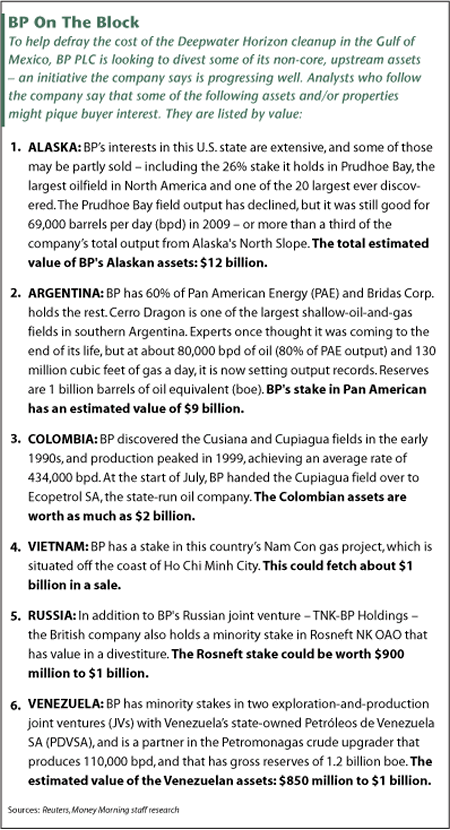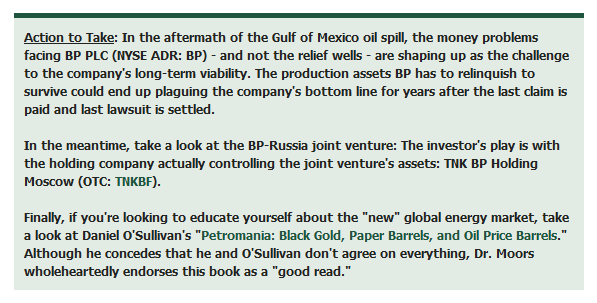The Surprise Threat to BP's Future
Companies / Oil Companies Sep 02, 2010 - 06:38 AM GMTBy: Money_Morning
 Kent Moors, Ph.D writes:
In the aftermath of the biggest environmental disaster in U.S. history, the Gulf of Mexico relief-well saga continues to monopolize our attention.
Kent Moors, Ph.D writes:
In the aftermath of the biggest environmental disaster in U.S. history, the Gulf of Mexico relief-well saga continues to monopolize our attention.
But here's the reality: Money problems - not the relief wells - could prove to be the undoing of BP PLC (NYSE ADR: BP). And that means the company's fate is most closely tied to its ongoing efforts to raise money by selling key assets from around the world.
BP is looking to divest $30 billion in assets during the next 18 months.Selling its assets is one way for the company to raise the money needed to cover its expected liabilities. But here's the problem: Those sales are moving right into the teeth of a new round of mergers-and-acquisitions (M&A) deals that were already taking place in the oil-and-gas sector, due to rising volatility there and the inability of some to withstand the uncertainty.
As a result of all this wheeling and dealing, the big will get bigger - and BP will get smaller. Indeed, the BP that emerges from the mess that it created should be smaller, leaner and smarter. But will that be good enough?
The Three Paths to $50 Billion
Although the public has fixated on $20 billion as the amount BP needs to raise, the BP brain trust has decided that the aggregate liability could extend to $50 billion. The public fixation on the $20 billion figure comes from the fact that this is the total amount of the BP compensation fund that the company is just now beginning to make payments from.
The larger figure may be the more realistic one, given that BP is now moving into years of litigation, assessing of damages, and counter-suits with such other affected companies as Transocean Ltd. (NYSE: RIG), Halliburton Co. (NYSE: HAL), Anadarko Petroleum Corp. (NYSE: APC), and Cameron International Corp. (NYSE: CAM).
I've been an advisor to these guys on three continents. And my sources high up in BP are clear about one thing: The company has three ways to raise that kind of money. And it is moving on all three of the following fronts:
•It is acquiring lines of credit in the amount of $15 billion to $20 billion, one of which is already secured from Credit Suisse Group AG (NYSE ADR: CS) (more on that one in a moment).
•BP plans to obtain between $15 billion and $30 billion from the sale of assets.
•Finally, BP will either issue a supplemental placement for the remainder in BP common stock or will float bonds.
There are problems with each of these options.
Take the last option. The more BP has to rely on selling shares, the more it is effectively diluting existing shareholders or mortgaging future cash flow. Support from sovereign wealth funds, especially those in the Persian Gulf, may temper that somewhat. After all, a private placement with a buyer not interested in reselling the shares anytime soon would be the preferred approach, as would bonds with a likely rollover potential.
Yet here's the basic problem.
BP is already spinning off assets.
In July, BP struck a deal to sell oil-and-gas properties in the United States, Egypt and Canada to Houston-based Apache Corp. (NYSE: APA) for $7 billion. In August, BP agreed to sell its Colombian oil-and-gas exploration-and-production business to Ecopetrol SA (NYSE ADR: EC) and Talisman Energy Inc. (NYSE: TLM) for $1.9 billion. Finally, just this week, BP said it was selling a $363 million stake in its Malaysian petrochemical businesses to Petroliam Nasional Berhad, the state-run holding company for Malaysia's oil and natural gas concerns that's better known as Petronas.
Moving forward, these divestitures - the additional ones planned - will reduce the company's profit base. That's not ideal at a time in which the company is looking to issue additional shares - or to secure bank credits. And here's why: In addition to the assets it puts on the auction block, BP will need to tie up other assets as collateral for the loans it will take out.
And that is causing some real concern in government circles - like in the Kremlin, for instance.
 Trouble in Russia ... and Vietnam ... and Venezuela
Trouble in Russia ... and Vietnam ... and Venezuela
About-to-be-replaced BP Chief Executive Officer Tony Hayward (you remember, the poor fellow who wanted his life back) was jetting around the Persian Gulf looking for financial support to avoid either a collapse or a takeover - Exxon Mobil Corp. (NYSE: XOM), for one, has been flying circles overhead, waiting to see if the patient dies.
In the middle of the trip, Hayward was summoned to Moscow.
Officials there were livid. It seems that BP used a stake it owns in Russia's state-controlled oil giant NK Rosneft OAO (LSE: ROSN.UK; OTC: RNFTF) as collateral for that Credit Suisse loan I mentioned. Russian officials literally called Hayward on the carpet and demanded to know what the company's overall strategy was going to be.
Here's one clue that you are in hot water with the government: You come into town as one of the major foreign investors in the country, yet neither President Dmitry Medvedev or Prime Minister Vladimir Putin has time to see you. For BP and Hayward, the best they could rustle up was Deputy Prime Minister Igor Sechin, who has oil-and-gas in his portfolio.
Now, Sechin is a no-nonsense administrator. He had a great concern in assessing BP's intentions: The fate of the half BP owns of one of Russia's top five oil producers, TNK-BP [The investor's play is with the holding company actually controlling the joint venture's assets: TNK BP Holding Moscow (OTC: TNKBF)].
The Kremlin apparently received the assurance it was looking for - BP will not be selling its holding abroad. But don't be surprised if the Russian partners in TNK-BP end up buying the package outright.
BP needs to raise cash quickly, and for that to happen, it will need to select assets carefully and sell them at a discount.
Plus, the Russian government is always paranoid about national resources being owned by foreign parties. TNK-BP is uncomfortably grandfathered under a new Russian statute. The venture controls strategic fields that, the law says, can have foreigners owning only minority positions.
And there is BP, sitting out there like a sore thumb, owning half of all of them.
Recognizing that BP is in an untenable position, some other governments are not waiting. Vietnam has decided that BP will be removed as operator in a new offshore project. Hanoi is actively shopping around the position to other international majors.
There is also Caracas to consider.
TNK-BP was one of five Russian majors banding together in a major deal to develop fields in Venezuela's Orinoco heavy oil belt. BP is pulling out, under pressure from President Hugo Chávez.
In areas as far-flung as Columbia, Texas, Egypt, Pakistan, and Alaska, BP has sold (or is planning to sell) its production assets. Cash only, please - no fancy stock swaps allowed in these transactions. The sales may end up accounting for more than 10% of the company's estimated $250 billion in worldwide assets and reduce the company's production figures by at least that much.
The bottom line: The money problems facing BP - not the relief wells - are shaping up to be the longer-term challenge to the company's ability to survive and thrive in the aftermath of the Macondo spill. The production assets BP has to relinquish to survive could end up plaguing the company's bottom line long after it has settled the lawsuits.
But there are those living in the Gulf States who might have a word for that - justice.

[Editor's Note: Dr. Kent Moors, a regular contributor to Money Morning, is the editor of "The Oil & Energy Investor," a newsletter for individual investors. In a career that spans 31 years, Dr. Moors has been consulting the energy industry's biggest players, including six of the world's Top 10 oil companies and the leading natural gas producers throughout Russia, the Caspian Basin, the Persian Gulf and North Africa.
As the preceding interview so clearly illustrates, Dr. Moors' experiences - as well as the unrivaled industry access, contacts and insights he possesses - are the backbone of the Energy Advantage, an energy-sector advisory service that enables investors to capitalize on his contacts and his global-energy-sector insights. For more information on that service, please click here.]
Source : http://moneymorning.com/2010/09/02/bp/
Money Morning/The Money Map Report
©2010 Monument Street Publishing. All Rights Reserved. Protected by copyright laws of the United States and international treaties. Any reproduction, copying, or redistribution (electronic or otherwise, including on the world wide web), of content from this website, in whole or in part, is strictly prohibited without the express written permission of Monument Street Publishing. 105 West Monument Street, Baltimore MD 21201, Email: customerservice@moneymorning.com
Disclaimer: Nothing published by Money Morning should be considered personalized investment advice. Although our employees may answer your general customer service questions, they are not licensed under securities laws to address your particular investment situation. No communication by our employees to you should be deemed as personalized investent advice. We expressly forbid our writers from having a financial interest in any security recommended to our readers. All of our employees and agents must wait 24 hours after on-line publication, or 72 hours after the mailing of printed-only publication prior to following an initial recommendation. Any investments recommended by Money Morning should be made only after consulting with your investment advisor and only after reviewing the prospectus or financial statements of the company.
Money Morning Archive |
© 2005-2022 http://www.MarketOracle.co.uk - The Market Oracle is a FREE Daily Financial Markets Analysis & Forecasting online publication.



